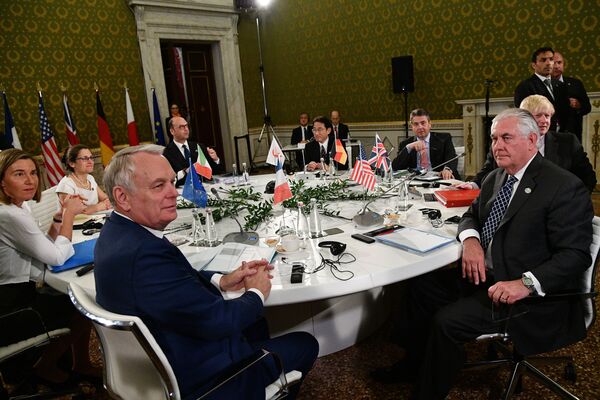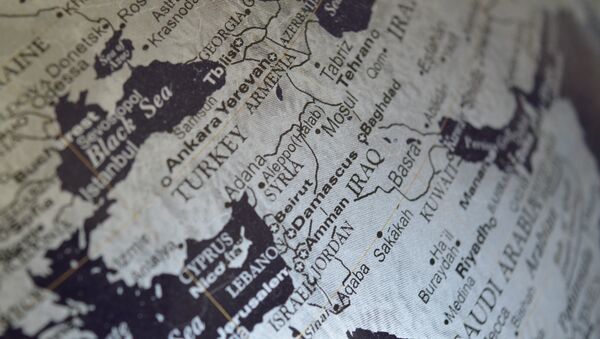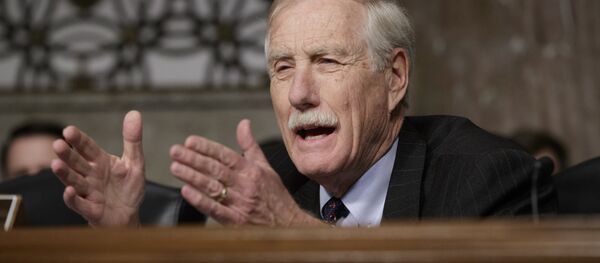On Tuesday, G7 foreign ministers wrapped up the second day of their two-day summit in Lucca, Italy, devoted to foreign policy issues, including Syria, proving unable to agree to new restrictive measures against Moscow and Damascus.
UK Foreign Secretary Boris Johnson had urged foreign ministers from the group of Western powers to consider new sanctions against Russia and Syria following the suspected chemical attack near the militant-held town of Khan Shaykhun last week. Western leaders rushed to blame the Syrian government for the attack, and Johnson called on Russian President Vladimir Putin to withdraw his support for Syria.

Late last week, the US fired 59 cruise missiles at the Syrian air base at Sha'irat, claiming that planes from the base had carried out last Tuesday's attack. Syria and Russia refuted the accusations, and condemned the strikes as a violation of international law.
Speaking to Sputnik, Dr. Tim Anderson, expert on economics and international politics at the University of Sydney and author of the book 'The Dirty War on Syria', said that the G7 countries' rejection of the UK-led effort to press for new sanctions was significant.
"It seems that the sanctions plan was mainly a US proposal," the academic said. "One of the big strategic axes of US policy is to try and prevent Europe and Russia having a normal relationship, and to try and maintain the Trans-Atlantic relationship, where the US has very strong control over European affairs."
Therefore, according to Anderson, the failure of the plan for new sanctions "may be something of an assertion of European interests against American interests."
Washington and London, on the other hand, are looking at the Syrian issue as a mercantile issue, according to the professor. Syria to them is seen as "something up for grabs, [where] really there is no inconsisten[cy] in intervening in the politics of other countries." This, Anderson said, helps to explain why the language being used by the two sides doesn't really fit together.
Furthermore, he noted, "because there's such a strong project, particularly by the US, to try and dominate the region, and to create what it calls the 'New Middle East', it keeps trying to apply that pressure onto Russia."
New Middle East map. 2006.
— Bobstar (@BobbyMageroski) 21 августа 2016 г.
Before Libya war, before Syria war, before ISIS .....https://t.co/Xq1iC1mKFg pic.twitter.com/xRA98p1u0h
Asked to comment on Tillerson's visit to Russia, which kicked off Tuesday, and the prospects it presents for actually ending the Syrian war, Anderson suggested that it's hard to say what can be expected from the secretary of state, in light of recent US actions.
"It's difficult to say, because on the one hand you would think Tillerson himself is a very pragmatic sort of person – he and Trump are both business people really. On the other hand, we've seen very erratic behavior by the Trump administration in the last week or so."
"One the one hand, they appeared to have backed away from the plan to try and have a strong hand in the future of Syria. On the other hand, within a matter of days, they launched missile attacks against Damascus on false pretexts. That's introduced a level of unpredictability in US affairs."
At the same time, Anderson suggested that Washington's decision to rain cruise missiles down on the Syrian base failed to achieve its goals, at least so far as foreign policy is concerned. "I think they probably meant to strengthen their hand by doing this, but they've [only] made a number of people very skeptical of their words" as a result.
Asked if he agrees with the assessment by some other observers that a Russian exit from Syria, as the US and UK have called for, would be tantamount to abandoning Damascus to the terrorists, the academic emphasized that there's a degree of truth in that.
"Wars have a lot to do with morale," Anderson noted. "The al-Qaeda [affiliated] groups in Syria got a big boost to their morale when Trump launched missile attacks against the Syrian airbase, even if it was relatively token attack in many respects. It killed a dozen people, but the military damage was relatively small. But it's a big morale boost [for these forces] and it has led to some the others, including Israel and Turkey, to put new demands on their intervention in Syria."

In other words, "if Russia was seen publically to back away from Syria, that would be a blow to the morale of Syria, and would lift the morale of [their enemies]." Ultimately, the academic stressed that "the united front – the alliance between Russia and Iran in Syria is a very important thing to resolve this conflict."
Furthermore, Anderson suggested that a lot of domestic considerations were also very likely involved, including the long-running claims that Trump was a Russian agent, but also his earlier criticism of President Obama over his failure to enforce red lines. Domestically, the observer stressed, the president seems to have at least temporarily satisfied his detractors. A significant section of the US media, for example, has gotten behind him over the Syrian attack.




